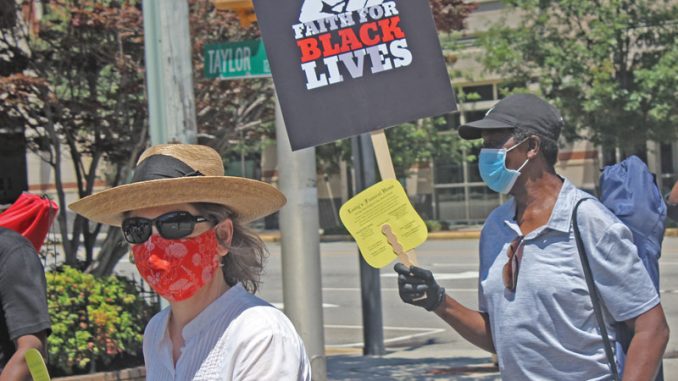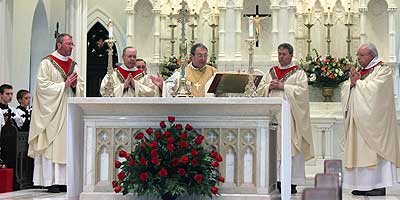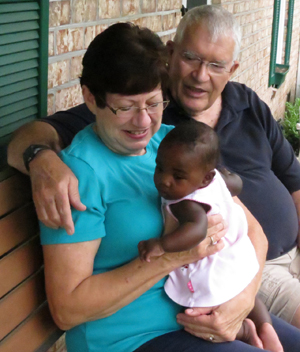
Black lives matter.
This phrase has been everywhere in the past two months since the death of George Floyd on Memorial Day caused protests to erupt nationwide. Protesters chant it and carry it on signs. Activists paint it on city streets. It is displayed at sporting events and on countless web sites and social media pages. Broadcast and print media discuss it constantly, and it comes up in daily conversations.
Some Catholics, however, see the phrase as problematic, and they ask questions about whether someone can follow Church teaching and also support the Black Lives Matter movement.
Some of the faithful around the country and in South Carolina have expressed concern about using the phrase because of its connection to the national organization, the Black Lives Matter Global Network Inc., which was formed in 2013.
They point out legitimate concerns with that organization’s official platform or “manifesto,” which can be found online, because it includes support for Marxist economic concepts, abortion, and transgender and LGBT issues. It also contains content that speaks about a broader concept than the traditional nuclear family. People also raise concern over images of Catholic laity, clergy and religious taking part in “Black Lives Matter” marches and protests.
Others say, however, that it’s important to remember that there is a huge difference between the legitimate sentiment behind the phrase itself along with the movement it has sparked and the agenda of the national organization.
The movement, they say, is focused on calling attention to the experience of Black Americans who have endured systemic racism for hundreds of years.
“We say ‘Black lives matter’ exactly because they have not mattered in this country for so many years,” said Kathleen Merritt, director of the diocesan office of Ethnic Ministries.
“Saying the phrase and meaning it has nothing to do with support of the organization,” she continued. “It’s to call attention to the fact that the lives of Black people have not been taken seriously and have not mattered to so many in this country for more than 400 years. We’re talking about the unjust killing of African-Americans that has gone on for so long.”
The issue of “Black Lives Matter” has come up many times in online discussions about racism and inclusion that Merritt has hosted over the past few weeks with teachers from around the diocese. One point she has stressed in the sessions is that supporting the meaning behind the phrase goes hand-in-hand with Catholic teaching on the sanctity of all human life.
“This is both a pro-life issue and a social justice issue,” Merritt said. “The deaths of the people who have been killed unjustly and the racism we see throughout our society can all be traced back to a basic disrespect for life.”
Merritt calls attention to the fact that even Pope Francis has weighed in on the issue. On June 3, he mentioned George Floyd’s death twice during a speech given at a general audience, and he told the faithful that addressing racism is part of the central Catholic concept of respect for all human life.
“My friends, we cannot tolerate or turn a blind eye to racism and exclusion in any form and yet claim to defend the sacredness of every human life,” Pope Francis said.
The pontiff also later made a personal phone call to Bishop Mark Seitz of El Paso after he knelt in public during a prayer vigil for George Floyd.
Racism as an attack on human life was also brought up in the United States Conference of Catholic Bishops’ 2018 letter on racism.
In it, the bishops wrote, “The injustice and harm racism causes are an attack on human life. The Church in the United States has spoken out consistently against abortion, assisted suicide, euthanasia, the death penalty and other forms of violence that threaten human life. It is not a secret that these attacks on human life have severely affected people of color, who are disproportionately affected by poverty, targeted for abortion, have less access to healthcare, have the greatest numbers on death row, and are most likely to feel pressure to end their lives when facing serious illness. As bishops, we unequivocally state that racism is a life issue … Racism directly places brother and sister against each other, violating the dignity inherent in each person.”
Judge Arthur McFarland, a member of St. Patrick Church in Charleston, said the overall “Black Lives Matter” movement is made up of countless people working together in many different groups statewide and nationwide, not all of which are connected to or support the agenda of the national organization. The goal of many people who use the phrase, he said, is to call attention to the problems that Black Americans have faced for generations.
“The movement itself is speaking to the experience and to the condition of Black lives in America,” McFarland said. “The phrase is a recognition of where we are right now in this country and the inequities that Black Americans face every day.”



